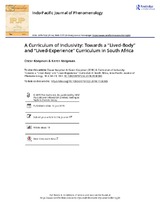| dc.description.abstract | Drawing on Merleau-Ponty’s “lived body” theory, we argue for a shift towards a lived-experience
and body-specific curriculum in South Africa. Such a curriculum would view learning as a lived,
embodied, social and culturally contextualised field. Its central aim would be to draw the learner into a
plane of consciousness conducive to being awakened to the act of learning through an attitude of
full attention. We specifically use the term “body-specific” to imply, as opposed to a one-size-fits-all
curriculum model, one in which lived experience and the “body” form the conceptual basis on which
the curriculum is built. Consequently, we reject the orthodox cognitive conception of the curriculum
which views learning as a mental exercise oriented towards the acquisition of pre-designed knowledge
that is “outer fixed” and “inner constructed”. In contrast, we propose that learning should be
outwardly constructed through lived experience and inwardly fixed (embodied) as knowledge develops
against the pre-noetic background of the lived world. Underpinning this is the essentially Merleau-
Pontian notion that the knowledge we hold originates from (i) our relationships with this world
that are embodied in experience, and (ii) our engagements within society and culture. The “inner” and
“outer” shift in learning infers a switch from pure, disciplinary, homogeneous, expert-led, supplydriven,
hierarchical, peer-reviewed and almost exclusively university-based learning to experiencebased,
applied, problem-centred, trans-disciplinary, heterogeneous, hybrid, demand-driven learning.
In such a curriculum, the role of the teacher would be to focus on how the world arranges itself
around the learner and to guide learners to see how the world reveals itself to them through their
personal lived experience. | en_US |

